- Home
- Dave Eggers
You Shall Know Our Velocity Page 2
You Shall Know Our Velocity Read online
Page 2
“Visas,” he said.
“Oh.”
“Visas,” he said again, now with venom.
“Fuck.”
Half the destinations were thrown out. Saskatchewan was fine but Rwanda and Yemen wanted them. What was the difference between a passport and a visa? I didn’t know exactly but knew there was a wait involved—three days, a week—and this was time we didn’t have. Mongolia needed a visa. Qatar, in a ludicrous show of hubris for a country the shape and size of a thumb, wanted a visa that would take a week to process. We were only three days away from the time Hand had taken off work.
He called again. “Greenland doesn’t want a visa.”
“Okay,” I said. “That’s where we start.”
The tickets were deadly cheap, about $400 each from O’Hare. Winter rates, said the Greenland Air woman. We signed on and got ready. Hand would drive up from St. Louis Friday and we’d leave Sunday, for a city that we couldn’t find in a dictionary or atlas. The flight stopped first in Ottawa, then at Iqaluit—on Baffin Island—before landing at Kangerlussuaq sometime around midnight. We agreed to limit the bags to one each—nothing checked, nothing awaited or lost. We’d both bring small backpacks—not backpacker backpacks, just standard ones, meant for books and beach towels.
“Coats?” asked Hand.
“No,” I said. “Layers.”
The cold in Chicago that January was three-dimensional, alive, predatory, so we’d head to the airport in everything we were bringing. We’d pack cheap disposable clothes so if we ever made it to Madagascar we could just dump the heavier stuff there. Then up to Cairo in T-shirts and empty bags.
“Okay,” said Hand. “You sure you want to pay for all this?”
“Yes. I need it gone.”
“You’re sure.”
“I am.”
“Because I don’t want you doing this as some weird purging bullshit thing. This doesn’t have anything to do with anything—”
“No.”
“Good.”
“See you tomorrow.”
I hung up the phone, jubilant, and threw myself into a wall, then pretended to be getting electrocuted. I do this when I’m very happy.
On Saturday I had to babysit my cousin Jerry’s twins, Mo and Thor, eight-year-old girls. Jerry was the only relative I had in Chicago. My mom had left Colorado to marry my father, leaving her parents, now dead, and three sisters and four brothers, all of whom stayed in or around Fort Collins. And now that Tommy—my six-years-older brother, with his own garage and mustache—was grown, my mom had moved to Memphis, to be near some old friends and take classes in anthropology. Jerry, my Aunt Terry’s son, the third of five, was the family’s first lawyer, with his picture in the yellow pages, and had married Melora, whose severity—she spoke only in hisses—was confounded by her small frame, that of a fourteen-year-old boy.
Jerry and Melora knew I was pretty much always around and available, so I got the nod and Hand and I brought Mo and Thor with us to get clothes and sundries. Jerry’s delicate wife hated my names for her girls but I wasn’t about to call two eight-year-olds, hyper kids who talked a lot, who liked to run ahead on the sidewalks and didn’t mind being thrown around, goddamned Persephone and Penelope.
They were dropped off, with a honk from Melora. We found them at the door to my building. They’d met Hand three times before but didn’t remember him.
“You don’t look as bad,” Mo said to me, her puffy pink coat swallowing her. I pulled the zipper down a few inches and she exhaled.
“It’s getting better,” I said.
“Now your eyes are blue,” Thor added, though my eyes were always brown and were still brown. She stepped toward me and I knelt before her. “And this is new,” she said, touching my nose, the red crooked stripe running down the bone.
“That was already there, idiot!” Mo said.
“Was not,” Thor said.
“It was there,” I said, trying to settle things, “but it’s darker now. You’re both right.”
We walked to a nouveau-outdoors store humid with nylon and velcro, energy bars and carabiners and a climbing wall no one used. Hand and I needed pants, pants to end all pants—warm and cool, breathing and trapping in, full of pockets. I got a standard pair of khakis, though with multiple pockets—the safari-photographer kind with the big rectangular compartments with zippers and velcro, two on each leg. Hand burst from the dressing room loudly swishing—his pants were wide, shiny and synthetic, in a grey that looked silver.
“You look like a jogger,” I said.
“They’re comfortable,” he said.
“Like a jogger with a dump in his pants.”
“Yeah,” Hand said, soaking his thumb in saliva and jamming it in Mo’s ear, “but I feel fast.”
The twins ran free and everything in the store looked essential. A tiny lightweight flashlight to attach to a keychain. Beef jerky. A first-aid kit. Secret pouches for money and passports. Bandannas. Mini-fans. Insect repellent. I avoided eyes, tried to save everyone the trouble of seeing me. My face wasn’t as bad as it had been a few weeks ago, but it was still busted in places, and the bridge of my nose dropped blue shadows into my eye sockets, lending me a crosseyed or cycloptic look. I appeared as I was: a guy who’d been given an ass whipping by three guys in a steel box.
“You’re limping still,” Hand said.
“Yes,” I said.
“It’s not that bad,” he said. “Just a little creepy is all.”
Hand had ten bandannas, five for each of us. Bandannas, he said, were what every traveler came back wishing they’d had more of. “You’ll thank me,” he said. He said this a lot, You’ll thank me. I don’t remember actually needing to thank him all that much, ever.
Mo and Thor returned from their explorations, hair matted, sweaters tied around their waists. They wanted to leave.
“Who wants to leave?” I asked Thor. “You, Mo?”
“I’m Thor,” Thor said.
“Who’s Thor?” I asked.
“I am!” she said.
“I’m sorry,” I said. “I can’t tell you people apart.”
“But we’re fraternal twins!” she said.
“You’re what?”
Mo rolled her eyes. “Fraternal twins! You know that, stupid.”
I stroked my chin, thinking. “Well, I guess I had heard something about this, but I didn’t think it was true. I guess I didn’t want to believe it.”
“What are you talking about?” said Mo. She was so easily annoyed, her face pinched like the tip of a tomato.
“Listen,” I said, crouching down in front of them both. “Do me a favor. Don’t let anyone tell you there’s something wrong with you. Don’t let any scientists or government researchers pull you aside and make you feel like freaks just because you’re twins and you don’t look alike. God made a mistake, and yes it was a very big one, because what kinds of twins don’t look alike? And worse, what kind of twins look like you two, like monkeys dunked in acid—”
Thor slapped me square in the forehead.
“You were talking too fast,” she said.
We took them to Walgreen’s. We needed provisions for the trip. The truth is, they were easily the least identical twins I’d ever seen, and only Thor looked like the product of their parents, who were both blond and fair. Thor was Aryan and thin-boned, but Mo looked more like me, with dark straight hair, dark eyes, long black lashes. I have the sort of eyelashes, black and shaped like bats’ wings, that imply I’m wearing eyeliner, and the good fortune this has occasionally wrought is nothing compared to the grief, the stares, the constant Robert Smith comparisons. Mo has been mistaken for my own kid and hates this.
I bought travel-sized toothpaste and a collapsible cup, sunglasses and two $7 sweatshirts, maroon and black. Hand had a large column of deodorant and we were at the cash register, waiting for the girls and watching the woman ahead of us assemble a small stack of coupons on the counter. Each coupon had been cut with care and the woman, tiny but with a
wide purple burn scar on her thin fragile neck, had them all bundled within a wide plastic clip intended to keep chips fresh.
I hated coupons. The need for coupons. I wanted to pay this woman’s difference. Two dollars she’d save and I wanted to give it to her so she could spend her time some other better way. What better way? I have no idea. Maybe she likes cutting coupons? She does not. Since I got a little money, this was a constant struggle, the frustration with people and their coupons, people and their dirty clothes, families from El Salvador living in the basement of the church around the corner—I passed them every morning, waiting at the bus stop with their daughter, on her way to school, in her white shirt, plaid skirt—and my urge to buy things for them, even just their food, and my inability, due to the imagined and impossible barrier between myself and these strangers with fumbling hands, to engage them and fix things. I never wanted a balance in a bank account, felt so much more comfortable living on the equator just above and below a zero balance, and I thought I could get rid of it some way, some way involving the coupon woman here at the Walgreen’s, and the coupons, but the distance seemed limitless and deadly, I was not outgoing in this way, could bridge nothing like this, and the situation just about killed me.
“Is that it?” Hand asked.
Mo and Thor were at the Walgreen’s counter now. They’d brought Valentine’s cards, a package of twelve.
“Yep,” Mo said.
“Do you sell stamps?” Thor asked the clerk.
“No,” said the clerk.
“You should,” she said.
“$23.80, please sir,” the clerk said.
“You getting any sunblock?” Hand asked.
I was not there.
“Will.”
I heard my name but couldn’t find my way to my mouth. I’d been hearing everyone talk but was not at all present.
“Will.”
I crawled back into my head.
“What?” I said.
People say I talk slowly. I talk in a way sometimes called laconic. The phone rings, I answer, and people ask if they’ve woken me up. I lose my way in the middle of sentences, leaving people hanging for minutes. I have no control over it. I’ll be talking, and will be interested in what I’m saying, but then someone—I’m convinced this is what happens—someone—and I wish I knew who, because I would have words for this person—for a short time, borrows my head. Like a battery is borrowed from a calculator to power a remote control, someone, always, is borrowing my head.
“Sunblock,” Hand said.
“No,” I said. He added a tube to my pile.
In the parking lot we watched a trio of milk-white Broncos drive by——and we all stopped momentarily. It was bad enough that they still made them in that color, but to see three at once seemed to bode ill. The girls were unimpressed, and I was not surprised. I’d given up trying to predict what would impress them. Just a few months before, we’d seen a grown man, older and babbling in what sounded like Russian, jogging down the street in a great blue butterfly costume, and they thought that was great. But the Broncos did nothing for them.
We passed a teenage couple in leather and studs, she with a mohawk and he with shaved head, his dented bruise-blue skull covered in messages rendered in ink the color of raw meat.
Mo got a running start and—“HiYA!” she yelled—kicked the man in the thigh. He was shocked. Hand and I were less shocked. The girls were learning karate at school, and liked to try it out on people who looked combative.
“Daaaaamn … freak,” the skull man said, wiping the footprint off his jeans. I apologized. I gave Hand a look, making sure he didn’t start talking.
“They’re not well,” Hand explained.
The skull man looked at me and blinked meaningfully, suggesting potential aggression. I had him by ten pounds; his outfit was apparently giving him strength. I couldn’t decide if I wanted this confrontation, if I wanted to leap from it, to make something explosive and open-ended—where would it end? I could ratchet this to true conflict and find some kind of deliverance—half of me was boiling, had been boiling for weeks or months or more—
Skull-boy and his friend pretended they thought Mo’s attack was funny—they didn’t—and kept walking. I exhaled and we did a serpentine Chinese dragon sort of run to the next block, all four of us yelling the chorus of “Froggie Went A-Courtin’.”
We dropped the twins back at Jerry’s, limiting conversation with Melora to our grunts and her squinting hisses, and we sped to the UIC hospital to get shots. The nurse, Glenda, about seventy with skin like redwood, pretended to be mad at us.
“You’re leaving when?” A coarse but lilting voice, half Chicago, half country.
“Tomorrow,” we said.
“You’re going where?”
“Greenland.”
“Greenland? There’s no malaria in Greenland! Why you want a malaria shot? And what happened to your face, honey?”
“Car accident,” I said.
“We might go to Rwanda,” Hand said.
“What? Which is it?”
“What do you mean?”
“You just said you was going to Greenland.”
“Well, maybe both.”
“It can’t be both. Are you relief workers or something?”
Hand nodded.
“No,” I said.
“You two are confused. How old are you people?”
“Twenty-seven,” I said.
“And you don’t have health insurance?”
“He does,” I said.
“No I don’t,” Hand said. I thought he did.
“Well you can’t get Larium today. You haven’t had a consultation. What’s the rush?”
“We only have a week,” Hand said. “Can’t you consult with us? We’re all here. Let’s consult.”
“No, with a doctor, honey. It takes an hour. If you came back tomorrow I could arrange it.”
“What can you give us without the consultation?” I asked.
“Typhoid and Hep A, B and C.”
“No malaria, though.”
“No. You need a consult. If you get malaria you’re gonna be regretting your big rush.”
“Is it fatal? Malaria?” I asked.
“Always,” said Hand, junior scientist. “It’s bad-ass.”
“Sometimes,” Glenda corrected.
“When is it not fatal?” I asked.
“You’ll live, if you get to a hospital.”
“Good,” I said. “We’ll get there.”
“We can drive. We’re fast,” Hand said.
“Stay in at night,” she said as we rubbed our arms. “You in Rwanda, any mosquito might have it.”
We thanked Glenda. She sat on her steel stool, waving goodbye with both hands, like a child popping bubbles from the air.
Through the hospital lobby I was following Hand and came around a corner to find him talking to a woman in a lab coat.
It was Pilar.
“Hey,” I said. She looked so slight.
“Hi,” she said. We hugged and she smelled, as always, of dogs and some kind of mint. She felt weightless. In high school she was robust, an athlete with broad tennis shoulders, but now she was rangy, her eyes bigger, cheekbones shooting angrily forward from her ears like dowels bowed. She’d dated Jack years ago but I bucked against the assumption—It has to be. It’s not that easy—that his death brought her transformation.
“What’re you guys doing here?” she asked. “What happened to your face?”
We told her about the inoculations, the trip.
“You don’t need that stuff for Greenland,” she said.
We tried to explain—the destinations beyond, everything.
“What about your face?” she asked again.
“I fell,” I said.
“Liar.”
“What are you here for?” Hand asked.
“I work here. In the lab,” she said, sweeping her hands down her coat, bringing Hand’s attention to the obvious.
“Oh,” he said.
“So why a week?” she asked. “Why not really do the trip right, like take a summer or something? You won’t see anything this way.”
I opened my mouth but couldn’t think of any way to answer. Someone was using my head to power a coffeemaker.
Hand was looking, thoughtfully, at the ceiling, while whistling soundlessly. Pilar, olive-toned and in high school dazzling and much-coveted, had given me one night, after she and Jack were no more, though it was obvious then that it was Jack who she cared for and I was a consolation, an approximation. Between Jack and Hand, both with easier smiles and better facial structures—beaten or not—it was a feeling I’d come to know well.
“We only have a week,” I said.
Pilar brought her fingers to her temples in a way one would if attempting to keep a flood within.
“Migraine?” Hand asked.
“No,” she said. “I mean, yes.”
“It’s good to see you,” he said, putting his arms around her. After a second he stepped back and I stepped forward and held her and then we all stood for a moment, waiting for someone to tell us what to do. A voice on the intercom was looking for someone. It sounded like Dr. Doobage. Hand laughed. We all laughed.
“That’s really his name,” Pilar said, then sobered.
“Well,” Hand said.
Pilar made a V of her hands and set her chin between her palms. Her eyes darted between us and quickly welled.
“It’s awful to see you two.”
We stayed up until four, in my kitchen, trying new itineraries and reading the Greenland website. The flight was eight hours away.
“Biggest island,” Hand said.
“Official language is Greenlandic,” I noted.
“Not just Greenlandic—West Greenlandic. West Greenlandic, as spoken in Sisimiut, Maniitsoq and the Nuuk area, is the official language of communication throughout Greenland. East Greenlandic is very different from West Greenlandic, but most East Greenlanders understand West Greenlandic.”
“Total population is 53,000.”
“Ice covers eighty-five percent of the landmass.”
“They’re desperate for tourists. They get about 8,000 a year, but they’re shooting for 60,000.”
“They name their winds. Listen: East Greenland has the Piteraq, a cold katabatic wind, a well-known and much-feared wind phenomenon. The highest gusts to date in Ammassalik were recorded in 1972 and measured 72 m/sec.”

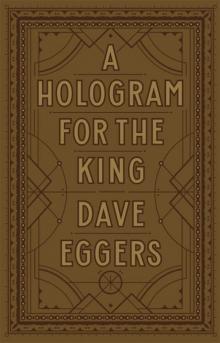 A Hologram for the King
A Hologram for the King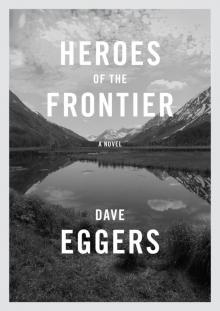 Heroes of the Frontier
Heroes of the Frontier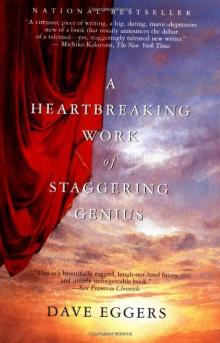 A Heartbreaking Work of Staggering Genius
A Heartbreaking Work of Staggering Genius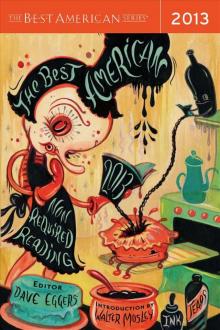 The Best American Nonrequired Reading 2013
The Best American Nonrequired Reading 2013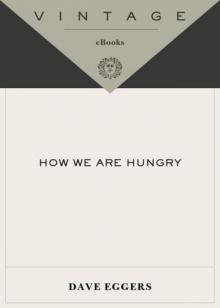 How We Are Hungry
How We Are Hungry The Circle
The Circle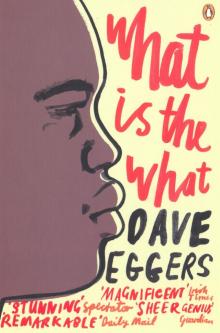 What is the What
What is the What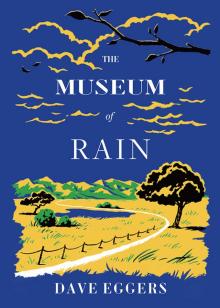 The Museum of Rain
The Museum of Rain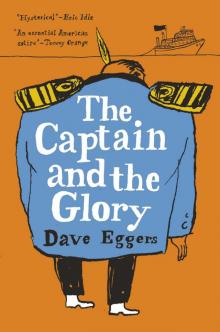 The Captain and the Glory
The Captain and the Glory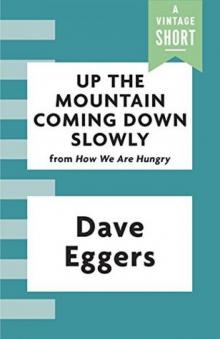 Up the Mountain Coming Down Slowly
Up the Mountain Coming Down Slowly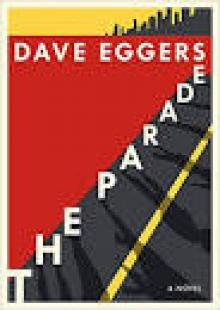 The Parade
The Parade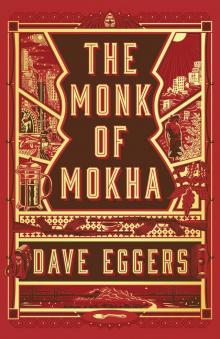 The Monk of Mokha
The Monk of Mokha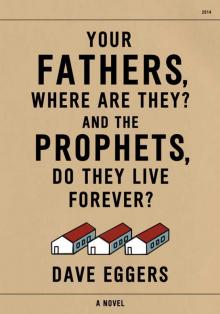 Your Fathers, Where Are They? And the Prophets, Do They Live Forever?
Your Fathers, Where Are They? And the Prophets, Do They Live Forever?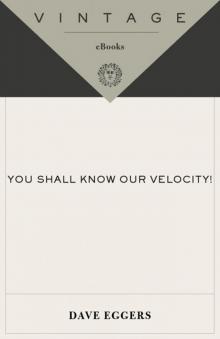 You Shall Know Our Velocity
You Shall Know Our Velocity The Wild Things
The Wild Things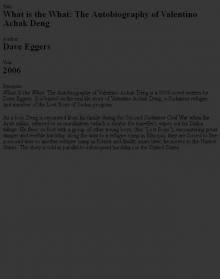 2006 - What is the What
2006 - What is the What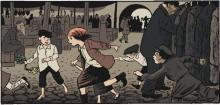 The Best American Nonrequired Reading 2011
The Best American Nonrequired Reading 2011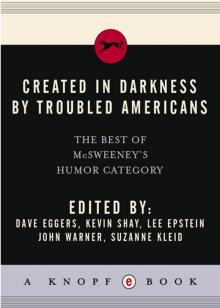 Created in Darkness by Troubled Americans
Created in Darkness by Troubled Americans